Acer Aspire S7 Ultrabook: Acer’s Best Foot Forward
by Jarred Walton on January 7, 2013 4:30 AM EST- Posted in
- Laptops
- Acer
- Intel
- Ivy Bridge
- Aspire S7
- Ultraportable
- Ultrabook
Performance, Now with Windows 8
As this is the first laptop we're testing with Windows 8, we've had to go back and revamp our testing suite a little bit. For example, PCMark Vantage simply refuses to complete under Windows 8 on the S7, and the same goes for a few other old Futuremark programs; we'll add the next versions of PCMark and 3DMark when they become available, but PCMark 7 and 3DMark 06 and 11 are the only Futuremark tests we’ll be running for now.
We're also taking the opportunity to upgrade several of our older benchmarks; we've been using the x264 HD 2.x encoding benchmark for a while now, but we're going to upgrade to 5.x with Windows 8—which, incidentally, takes about 10x as long to run. We will also be adding WinZip as a benchmark, with OpenCL acceleration enabled. Another benchmark we're adding with the S7 is TouchXPRT (currently in preview release) and a similar test from the same company called WebXPRT 2013. Anand has used both on the Clover Trail/Surface reviews, so it will be interesting to see what Ivy Bridge looks like by comparison. I’m not going to spend a lot of time on the tablet comparisons in terms of performance, but I also ran most of the current suite of tablet benchmarks, which we’ll look at on the next page (SunSpider, Kraken, etc.)
For the time being, that should be sufficient, but we'll be certain to add other benchmarks and tests to the mix as we deem them appropriate, so if you have any recommendations or suggestions we're happy to hear them. We will begin as usual with PCMark 7, which gives us at least some inkling of overall performance, along with our usual suite of CPU-centric tests. We shouldn't see any major surprises here, as the Acer S7 has the same components as many other Ultrabooks that we've tested. Here’s the quick overview of the test components for the various laptops:
| Laptop Configuration Overview | ||||
| Laptop | CPU | Graphics | Storage | Battery |
| Acer Aspire S3-951-6432 | Intel i7-2637M | HD3000 | 256GB SSD | 38Wh |
| Acer Aspire S5-391-9860 | Intel i7-3517U | HD4000 | 2x128GB SSD | 35Wh |
| Acer Aspire S7-391-9886 | Intel i7-3517U | HD4000 | 2x128GB SSD | 35Wh |
| Apple MacBook Air 13 (Mid-2012) | Intel i5-3427U | HD4000 | 256GB SSD | 50Wh |
| ASUS Zenbook Prime UX31A-DB71 | Intel i7-3517U | HD4000 | 256GB SSD | 50Wh |
| Dell XPS 13 | Intel i7-2637M | HD3000 | 256GB SSD | 47Wh |
| HP Envy 14 Spectre | Intel i7-3667U | HD4000 | 2x128GB SSDs | 56Wh |
| HP Folio 13 | Intel i5-2467M | HD3000 | 128GB SSD | 60Wh |
| Intel IVB Ultrabook Prototype | Intel i5-3427U | HD4000 | 240GB SSD | 47Wh |
| Toshiba Satellite U845-S406 | Intel i5-3317U | HD4000 | 500+32GB Hybrid | 54Wh |
| Toshiba Satellite U845W-S410 | Intel i5-3317U | HD4000 | 500+32GB Hybrid | 54Wh |
Before we get to the actual tests, I want to make note of the fact that this is bar none the fastest booting laptop or PC that I've ever used! Just how fast does the laptop boot up? How about under 10 seconds? Granted, much of that is probably Windows 8 (Dell’s XPS 12 posts similar boot times), but it's still impressive nonetheless. Shutdown, hibernate, and resume are all equally fast, though if all you do is put the laptop to sleep and wake it up you won’t need to worry too much about such things.
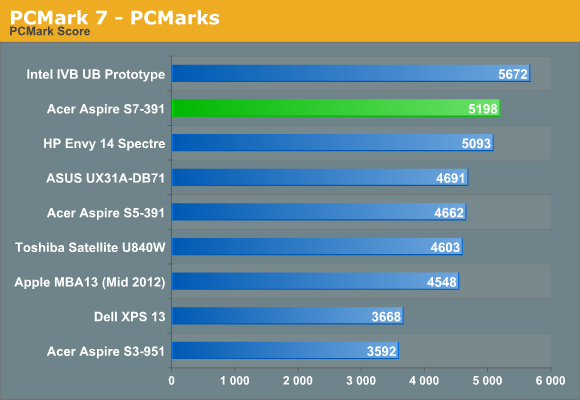
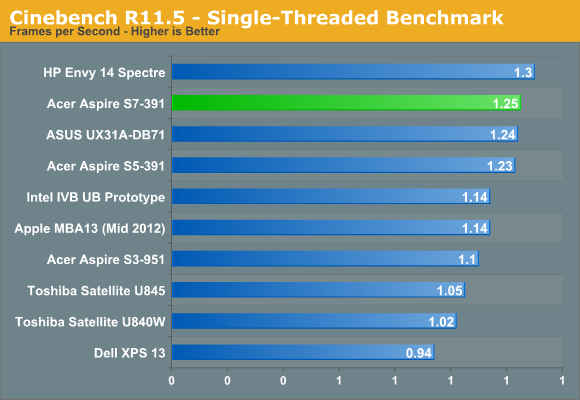
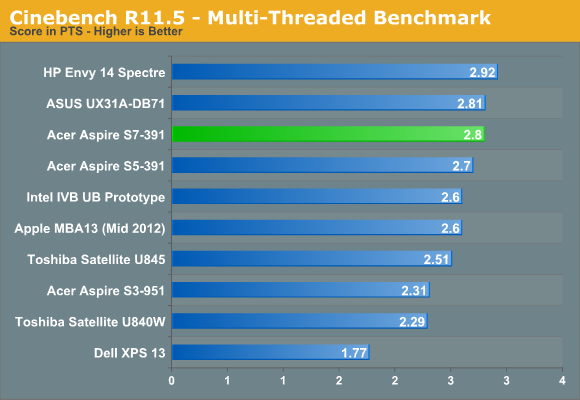
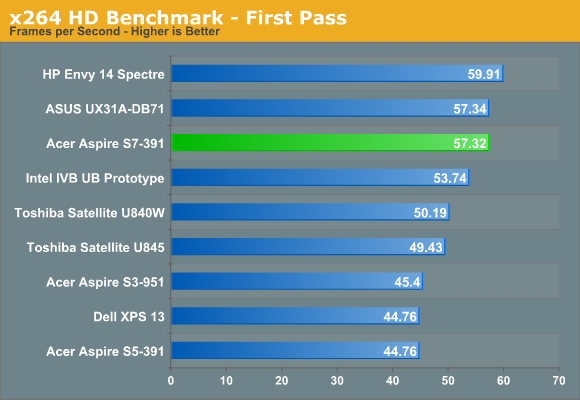
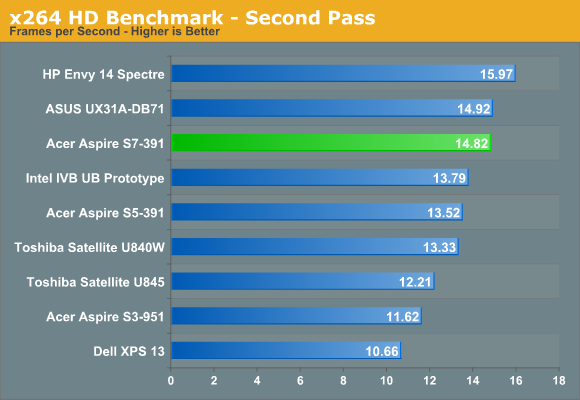
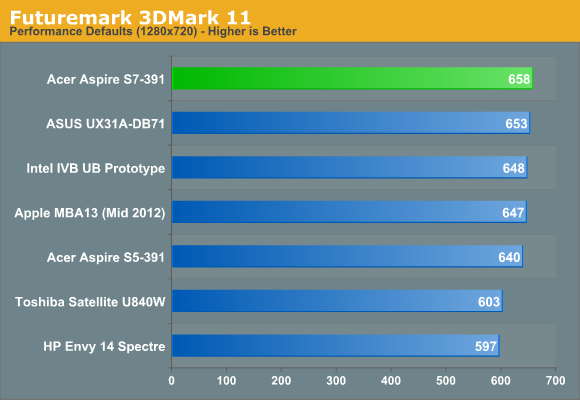
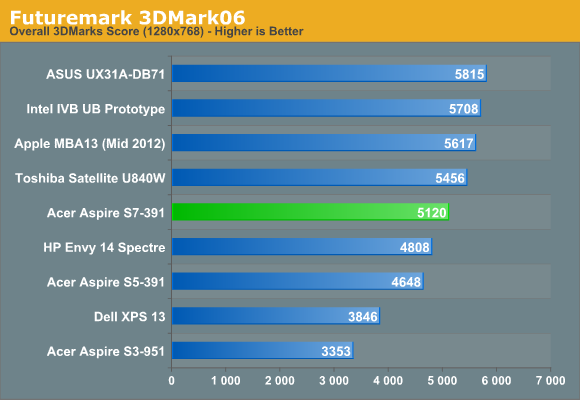
Our benchmarks start with an interesting piece of information: the Ivy Bridge prototype that Intel sent us still manages to hold onto the top spot in the overall PCMark 7 score, thanks in particular to its performance in the Creativity, Entertainment, and Computation suites—and this despite the fact that it’s equipped with a Core i5-3427U compared to the i7-3517U in other systems. (We only show the overall score above, but you can see the full set of PCMark7 results in Mobile Bench.)
It’s not quite clear what’s holding the S7 back, but while it has the top Storage score, it falls well short in the Lightweight and Productivity suites. Possibly Windows 8 is partly to blame, or more likely the combination of components (and possibly that RAID 0 storage setup) are coming into play. Then again, PCMark7 is prone to odd variations, and depending on the drivers (Quick Sync) and storage you can see large differences between what should otherwise be similar laptops—just look at how the earlier Aspire S5 with Windows 7 stacks up to the new Aspire S7!
The other benchmark charts are more in line with what we’d expect. HP’s Envy 14 Spectre snags the top spot for all of the CPU benchmarks, which makes sense considering it has the highest clocked i7-3667U processor of the bunch. The Acer S7 and ASUS UX31A are tied, which goes with their identical CPUs. 3DMark06 does show the Acer falling behind, but here again I’d look more at Windows 8 than anything specific to the S7. The march of time and/or drivers also shows a nice progression when looking at the S3, S5, and S7










53 Comments
View All Comments
calyth - Monday, January 7, 2013 - link
Well, $500 laptop is fine for most uses, until you try to do anything that generates a lot of heat. Playing a game, converting video, etc etc.Most of the windows laptop in that range has heatsinks that copes with the average uses, but any spikes, and it would just wear out pretty quickly over time.
While MacBooks may have that aluminum frame advantage (in terms of heat dissipation), none of the current line up use anything particularly better than an Intel IGP. Getting the 650M requires $1700 bucks or more.
I don't particularly think that Acer's attempt here is bad, and Windows laptop gets close to Apple styling for more bang for the buck anyways. But for me, I kinda wish to get a decent laptop that could cope with work loads a little better, for reasonable cost, and not look like a brick (e.g. Dell Lattitudes). Thats' still not really happening.
Silma - Monday, January 7, 2013 - link
I almost purchased Acer's Aspire S7 but I didn't in the end because of the following shortcomings which are often shared by all PC manufacturers:- Acer, who do you think you are, mutilating the keyboard for no good reason?
- Battery. I would prefer a 1 or 2mm thicker Ultrabook any day for a (replaceable) decently sized battery, e.g. 70 Wh or more.
- Cooling and noise. Please add value, don't be an assembler and work harder on cooling and noise. Most owner reviews complain about both.
- Soldered memory. If you absolutely want to solder memory instead of making it upgradable, then you need to offer 8 GB at the very least, especially at this super premium price. Even better offer an Ultrabook with upgradable memory.
- Non replaceable SSD. Again, for a super-premium laptop, one should expect at least 3 years of usage, which means upgrading the SSD down the road.
It is really a shame as the following points made the Aspire S7 extremely endearing:
- Kudos for the choice of a touch-enabled, full HD and IPS panel, which makes this screen 3x better than most offering (hall of shame: Lenovo X1 Carbon super crappy screen at $1.5k +)
- Kudos for the aesthetic. It won't please all people, but at least it went further than most manufacturers
- Kudos for the very decent computing power.
DanNeely - Monday, January 7, 2013 - link
I've seen speculation elsewhere that it's the touchscreen that are responsible for the poorer battery life seen in w8 laptops vs their w7 ancestors; but I haven't seen anyone try to confirm this by disabling it and rerunning any of the battery tests.CadentOrange - Monday, January 7, 2013 - link
We've established that they're gunning for Macbook air prices, but other than that is it really comparable?How does the keyboard feel? I've seen the keyboard panned in the Ars review, and I tend to agree with them. If I'm spending $1500 on a laptop, I'd like a keyboard that doesn't feel clobbered together. Where are the function keys? Why is there no space between the "\" key and "Enter"? Does that annoy in practice?
The battery life is abysmal. If you're going to charge as much as an Air, you really should perform like an Air. I'm no Apple fanboy, I have a 2nd hand Macbook and all my other PCs and server run Linux. It's in my interest that PC manufacturers produce products that rival Apple's. This is sadly not even close.
KPOM - Monday, January 7, 2013 - link
Compared to the 13.3" MacBook Air with 256GB, which retails for $1499 with the 1.8GHz i5 and $1599 with 2.0GHz i7, the Asus has a better display (1920x1080 IPS touchscreen vs 1440x900 TFT non-touch), a processor that splits the difference, and lighter weight. Battery life is a bit disappointing, but overall it looks like a competitive package. The challenge is that PC buyers aren't used to paying these kinds of prices. The quality appears to be there (though the keyboard discussion is a bit worrying).ananduser - Monday, January 7, 2013 - link
The machine reviewed is an Acer not an Asus.Death666Angel - Monday, January 7, 2013 - link
Those are the things I would like to see. I don't want RAID 0, the battery needs to be bigger for me (and I don't care that much about height, so make it 2cm and double the capacity or something) and 4GB of RAM are a joke in this day and age. The rest looks fine enough. :)Tech-Curious - Monday, January 7, 2013 - link
Yeah, the RAID and the RAM are the dealbreakers for me -- and perhaps amusingly, those are the two cheapest things to fix. Switch off RAID and instantly the value proposition of the storage system is doubled. As for the memory, yeah; my old Clevo laptop's 4GB of RAM was impressive back in early 2008. Now, not so much. C'mon Acer, spring for 8GB.Those two changes represent maybe $30 of extra cost in parts, but they'd increase the perceived value of the whole product by $200-300, IMO, and maybe more to the general consumer.
I wonder how much money Acer would save by swapping out the touch screen. :)
Death666Angel - Monday, January 7, 2013 - link
I would like to meat the person who made those 2 decisions and get their explanation for it. With graphics cards, companies/marketing brag about 3GB on a GT630 or something, but with many Ultrabooks, they don't deliver even though the added cost is likely to be very low.Also, the missing F-Keys is not very nice. I don't use them super frequently, but they do add to my productivity in certain scenarios and it looks like they would have fitted on the laptop easily.
And lastly, I just ran Kraken on my desktop PC (i7 860 which is quite old by PC standards): 2515.1ms +/- 2.7%... didn't expect that much to be honest. :)
Death666Angel - Monday, January 7, 2013 - link
And my Galaxy Nexus manages 25,728.6ms /+-11.9%. That is strange.